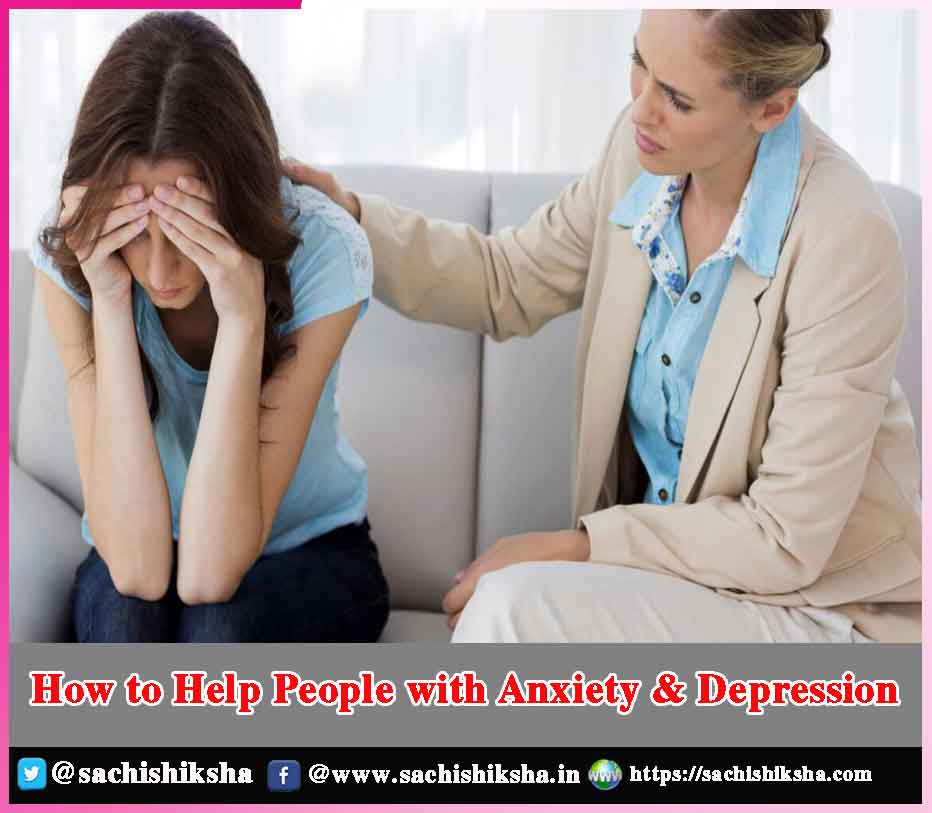How to Help People with Anxiety & Depression
Introduction: Depression has different symptoms in everyone and not all people suffering from depression behave in a similar manner. If someone is suffering from depression or anxiety, they can sound very negative in their way of talking than usual or they can be feeling hopeless or pessimistic; they can look tearful or sadder than normal; they can look least interested in communicating or spending time with friends;
they can have the baggage of some sort of guilt on their shoulders or they might feel worthless about themselves; their self-confidence and self-esteem may be extremely low or they might seem very tired with almost no energy for doing anything; they may face problem in sleeping or sleep a lot than normal; they might not care about their looks or avoid basic hygiene such as taking bath;
they might lose interests in the things they used to love before; they might have an unusual appetite, they might be eating too much or too little, and they might be talking about death and suicide. It is very important to support people with anxiety or depression in their low and dark phases to protect their mental health and lives.
Also Read:
- 12 Mental Tricks to Fight Depression
- When Sadness Touches Our Lives – Depression
- Relief From Depression
- Indian Joint Families, Need of the Hour
Table of Contents
Conversation:

It is important to understand that we must not give pieces of advice to people with anxiety or depression because they are not in that state of mind or control to follow those pieces of advice and work for them. That is why, it is important to make them feel loved, supported, and listened to. Their feelings must be respected and validated so that they might not feel ignored. Empathy can cure them in a better way than medicines.
Daily Tasks:
A person with anxiety or depression can find everyday tasks such as grocery, laundry, cooking, studying, going to school, preparing for exams, etc extremely overwhelming. They might not be able to decide where to begin the tasks from. Hence, it is very crucial in such cases to offer them help and assistance so that they don’t feel overloaded because of pending work. While doing the work in the company of another person, they can feel relaxed and less stressed.
Giving Invitations:
People with anxiety or depression might feel like canceling plans and not going to get-togethers and friend-meet which can increase their isolation level. Hence, it is important to stay in touch with them and not stop them from giving invitations in order to make them feel wanted and less lonely.
Patience:
One can experience improvement in the level of depression with therapy but it does not completely take away all the anxiety. Hence, it is quite normal that a person with anxiety or depression can show some symptoms of depression even after coming back from therapy. A good day in their life does not mean that they are completely cured and anxiety has left them because it is totally normal to have good as well as bad days. Hence, it is crucial to show some patience towards their slowly improving mental health.
Research on Depression:
Depression can take various forms such as low mood, waves of sadness, irritability, anger, difficulties with memory, confusion, focus in difficulty, sleep issues, extreme fatigue, physical symptoms like regular headaches, stomachaches, muscle or back pain, etc. If one sees any such symptoms in any individual, always a hand of help should be offered to them.
Things to Avoid With People Suffering From Anxiety or Depression:
Taking Things Personally
A depressed individual is not responsible for their depression, so if they show some frustration, anger, or cancel plans, it should not be taken personally to heart because they are not in the proper state of mind and feel emotionally very drained. Their decisions and feelings must be handled with empathy, care, and respect.
Fixing Them
Depression is a very serious mental health problem that is hard to be cured without professional therapy. It is difficult for an individual to understand the feeling of depression until he has experienced it personally. So, one should not try to help people with anxiety or depression by saying statements such as ” Start practicing gratitude for good things in life”, “Ignore bad things in life ” etc. Their mood can be lightened by appreciating their presence when they are feeling low so that they feel important as well as worthy.
Bits of Advice
Although a good diet and exercises like yoga can improve the state of depression but it is very difficult for an individual with anxiety or depression to bring such changes in their lifestyle. Hence, it is not recommended to give such lifestyle advice to people suffering from anxiety or depression because they are not in a state of mind to push them to do what is good for them. Hence, it is better to listen to their feelings with empathy without trying to impose things on them.
Comparing Experiences
Depression in every individual looks different. Some might show mild symptoms, on the other hand, another individual might be suffering from clinical depression. Hence, it is not advisable to try to treat an individual with similar tactics that worked on another individual.














































